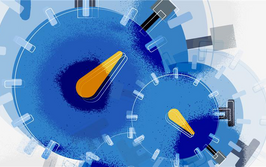Gene Therapy Trial Helps Children with LAD-I
Gene therapy clinical trial shows striking outcomes in children with rare and often fatal immune disorder
Stephanie Vine | | 2 min read | News

Original images sourced from: Pixabay.com
A new gene therapy developed through an international clinical trial co-led by University College London, Great Ormond Street Hospital for Children (GOSH), Hospital Infantil Universitario Niño Jesús, and the University of California, Los Angeles, has shown encouraging results in treating leukocyte adhesion deficiency-I (LAD-I), a rare and often fatal immune disorder that affects infants and young children. LAD-I is caused by mutations in the ITGB2 gene, which prevent the body from producing the protein CD18, which plays a critical role in helping white blood cells travel to sites of infection. Without functional CD18, children with severe LAD-I experience repeated and often serious infections. Without treatment, survival beyond early childhood is uncommon.
One of the most striking outcomes in the trial was in a child named Eisa, who received the treatment at ten months old. Now four years old, he is healthy enough to attend school and has undergone heart surgery. He is recovering normally – something that would have been highly unlikely without the therapy.
The standard treatment for LAD-I has typically been a bone marrow transplant from a matched donor, which can be difficult to source and carries risks such as graft-versus-host disease.
For the gene therapy, clinicians collected the children’s own stem cells and used a modified lentivirus to deliver a working copy of the faulty gene. After preparing the patients with conditioning therapy, the corrected cells were returned to their bodies. All nine children, who were between five months and nine years old, began producing functional CD18 and showed clear improvements over the following one to two years. Their immune systems became more robust, and the symptoms of LAD-I eased significantly.
Claire Booth from UCL and GOSH said: “We are thrilled for Eisa and all the children in this trial but also because this success has far-reaching implications, beyond severe LAD-I. As this process has been shown to be successful for such a complex disease, we could move towards a blueprint to treat many other diseases. Gene therapy is being explored by teams at GOSH and our partners for blinding conditions, muscular dystrophies, cancer and others – the possibilities are really far reaching.”

Making great scientific magazines isn’t just about delivering knowledge and high quality content; it’s also about packaging these in the right words to ensure that someone is truly inspired by a topic. My passion is ensuring that our authors’ expertise is presented as a seamless and enjoyable reading experience, whether in print, in digital or on social media. I’ve spent fourteen years writing and editing features for scientific and manufacturing publications, and in making this content engaging and accessible without sacrificing its scientific integrity. There is nothing better than a magazine with great content that feels great to read.



















